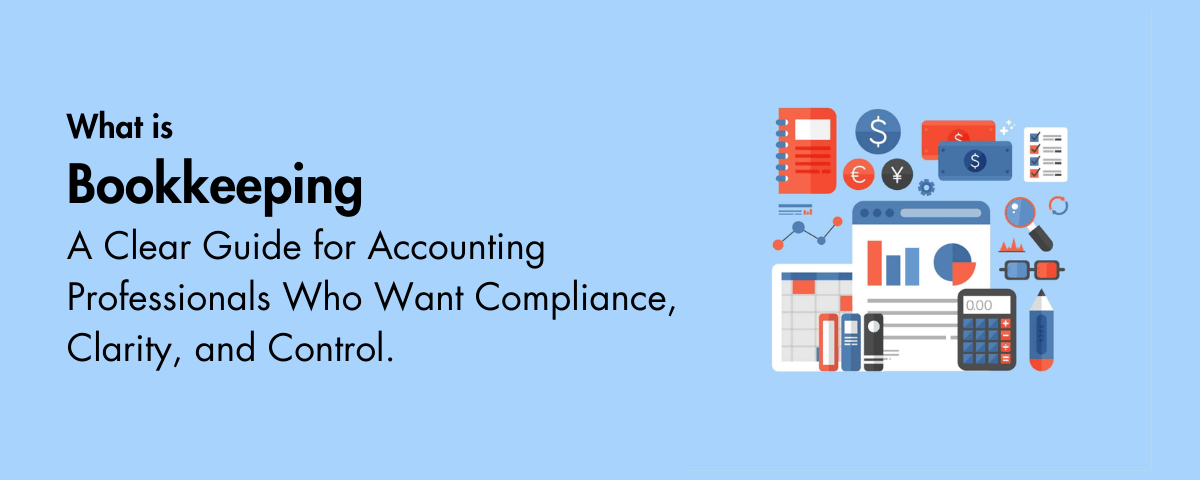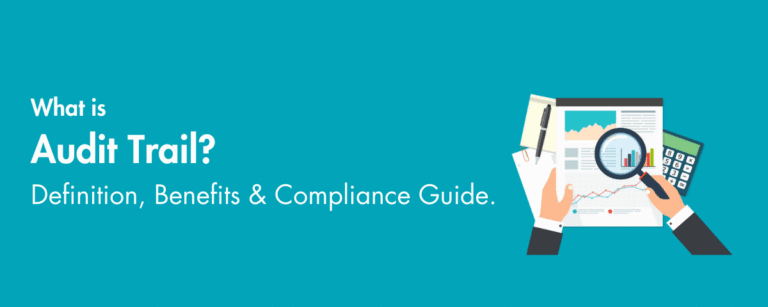At Accountably, we work with CPAs, EAs, and accounting firms every day, and we’ve seen what happens when bookkeeping is left to the last minute: compliance risks go up, decision-making slows down, and growth plans stall.
The good news? Bookkeeping doesn’t have to be overwhelming. When done right, and done consistently, it gives you the clarity to make better financial calls, keeps you audit-ready, and frees up your brain (and calendar) for actual strategic work.
So, let’s cut through the noise and talk about what bookkeeping really is, how it’s evolved, and why it matters so much for firms like yours.
Table of Contents
- What is Bookkeeping (Without the Textbook Talk)?
- A Quick History Lesson (Because It’s More Interesting Than You Think)
- The Role of Bookkeepers (And Why Firms Are Outsourcing This More Than Ever)
- Why Outsourcing Bookkeeping Makes Sense for Accounting Firms
- From Petty Cash to Cloud Accounting
- How Bookkeeping Actually Works: From Daybooks to Financial Statements
- From Records to Reports: Trial Balances and Financial Statements
- The Built-In Error Detection System
- How Bookkeeping Helps Prevent Fraud
- Profitability Through Clarity
- Technology as a Safety Net
- Why Firms Are Turning to Offshore Bookkeeping Teams
- The Skills Every Good Bookkeeper Needs
- Bookkeeping vs. Accounting: Clearing the Confusion
- When (and Why) to Outsource Bookkeeping
- Resources for Firms Wanting to Strengthen Bookkeeping
- Final Takeaways: Bookkeeping as the Backbone of Your Firm’s Success
- The Accountably Difference
- Your Next Step
What is Bookkeeping (Without the Textbook Talk)?
At its core, bookkeeping is about tracking every single financial move your business makes. We’re talking:
- Client payments coming in
- Vendor bills going out
- Payroll, benefits, and reimbursements
- Software subscriptions, office expenses, and even coffee runs
Every transaction gets recorded, usually backed by a source document (an invoice, receipt, or bank statement) so there’s proof and a clear trail. These records aren’t just for show, they’re the foundation for creating accurate financial statements, managing cash flow, and staying on the right side of tax and audit regulations.
If your financial statements are the map, bookkeeping is the GPS signal that makes sure you’re not lost.
Why Bookkeeping is the Lifeline of Your Firm
Here’s the thing: you can’t give your clients clear financial advice if your own house isn’t in order. And even if you’re great with numbers, it’s easy for bookkeeping to slip when client work piles up.
When bookkeeping is tight and current, you:
- Produce Accurate Financial Statements
The data behind your income statement or balance sheet is only as strong as your bookkeeping. - Track and Control Cash Flow
Real-time records mean you know exactly what’s coming in and what’s going out, no surprises. - Stay Audit-Ready
Whether it’s an IRS audit or a client request, you can pull accurate records without a scramble. - Spot Red Flags Early
Consistent recording makes it easier to catch errors or fraud before they snowball.
This is exactly why many of our clients at Accountably choose to outsource accounting and bookkeeping to our offshore teams. We handle the day-to-day recording, categorizing, and reconciling so your in-house staff can focus on higher-value work.
A Quick History Lesson (Because It’s More Interesting Than You Think)
Bookkeeping has been around a lot longer than spreadsheets or cloud software.
- Ancient Mesopotamia (2600 BC): Traders carved transactions into clay tablets to track goods, the earliest “ledger” we know.
- Babylonian and Egyptian Systems: Detailed records of taxes, labor, and inventories helped keep economies running.
- The Double-Entry Revolution: In 1494, Luca Pacioli documented the double-entry method, every transaction has a debit and a credit, which became the gold standard for accuracy and balance.
- Waste Books to Modern Ledgers: Before ledgers were organized, people kept “waste books”, messy, daily notes of transactions, and later transferred them to neat, permanent records.
- Today: Digital, cloud-based platforms like QuickBooks and Xero automate much of the process but still rely on accurate entry and review.
Bottom line: while the tools have changed, the core principle hasn’t, track everything, keep it accurate, and make it easy to verify.
The Role of Bookkeepers (And Why Firms Are Outsourcing This More Than Ever)
When most people picture a bookkeeper, they imagine someone typing numbers into a spreadsheet all day. And yes, that’s part of it, but in reality, a good bookkeeper is more like the financial air traffic controller for your firm.
They’re the ones making sure every financial transaction is accurately recorded, categorized, and backed by documentation. They keep the books balanced so you (and your clients) can make decisions based on facts, not guesswork.
At Accountably, we see bookkeepers as the unsung heroes of accounting operations. Without them, your financial data can quickly become outdated, unreliable, and a compliance risk.
What Bookkeepers Actually Do (Day-to-Day)
If you’ve ever wondered exactly what falls under bookkeeping, here’s the shortlist of core tasks:
- Record Transactions in Real Time
Whether it’s a client payment, a supplier invoice, or a payroll run, bookkeepers make sure it’s logged right away. - Categorize Everything
Each transaction gets sorted into accounts, expenses, revenues, assets, liabilities, so reports make sense. - Reconcile Bank Statements
This is where mistakes (or fraud) get caught. The bookkeeper compares the firm’s records with the bank’s to spot discrepancies. - Maintain Ledgers
Ledgers act as the master list of all financial activity, organized by account. - Prepare Basic Financial Reports
Things like income statements, balance sheets, and cash flow summaries often start in the bookkeeping department.
When all of this runs smoothly, your accountants can focus on deeper analysis, tax planning, and client strategy instead of chasing missing transactions.
The Essential Bookkeeping Systems
Bookkeeping isn’t one-size-fits-all. There are different systems depending on complexity, volume, and compliance needs.
Single-Entry Bookkeeping:
- Records each transaction once (cash in or cash out).
- Best for very small operations with minimal transactions.
- Simple, but offers limited error detection.
Double-Entry Bookkeeping:
- Every transaction has two entries: a debit in one account, a credit in another.
- Balances the accounting equation: Assets = Liabilities + Equity.
- Industry standard for accuracy and compliance.
For most accounting firms (and their clients), double-entry is non-negotiable, especially if compliance and audit readiness are priorities.
Why Outsourcing Bookkeeping Makes Sense for Accounting Firms
Even though accounting firms can handle their own bookkeeping, many are realizing they shouldn’t. Why? Because keeping it in-house eats up valuable time that could be spent on revenue-generating work.
Here’s what outsourcing with Accountably can do for your firm:
- Cut Costs Without Cutting Quality
Our offshore staff cost less than hiring locally but are trained to the same professional standards. - Scale Without Adding Payroll Headaches
Need more help during tax season? We can expand your team in days, not months. - Stay Compliant, Always
We train our teams on U.S. GAAP, IRS requirements, and industry-specific rules. - Free Up Your In-House Team
Let your local staff focus on client relationships, advisory work, and growth strategies.
In short, outsourcing lets you keep the books clean while keeping your best people focused on high-value tasks.
From Petty Cash to Cloud Accounting
Bookkeeping covers everything, even the small stuff like petty cash. While many firms have moved almost entirely to digital transactions, petty cash still needs to be recorded under a clear system (usually the imprest method, where a set fund is replenished when it runs low).
Modern bookkeeping now integrates automation:
- Cloud Software like QuickBooks or Xero for real-time entries.
- Bank Feeds for automatic reconciliation.
- OCR Tools for scanning and recording receipts instantly.
The role of the bookkeeper hasn’t gone away, it’s just evolved to include managing and checking the tech that now does a lot of the heavy lifting.
How Bookkeeping Actually Works: From Daybooks to Financial Statements
By now, you know bookkeeping is more than just entering numbers into software. It’s a structured process, and every step plays a role in making sure your financial data is both accurate and audit-ready.
At Accountably, we train our offshore teams to follow this structure down to the smallest detail. That way, when your firm needs to run a report or prepare for tax season, every number is already verified and in the right place.
Let’s walk through the workflow.
Daybooks: The First Stop for Every Transaction
Think of daybooks as the raw “transaction diary” for your business. Any time money changes hands, a sale, a purchase, a payment, it gets written here first, in chronological order.
In the past, this was a literal book on a desk. Now, it’s usually a digital file. The goal is to capture the details immediately so nothing is forgotten.
Common types of daybooks include:
- Sales Daybook: Records all credit sales.
- Purchase Daybook: Tracks all supplier purchases on credit.
- Cash Receipts Daybook: Lists cash coming in.
- Cash Payments Daybook: Lists cash going out.
Once entries are confirmed, they move to journals.
Journals: Organizing the Chaos
Journals are like daybooks, but tidier. Instead of just logging transactions as they happen, journals categorize them: sales, purchases, cash receipts, disbursements, etc.
Each entry includes:
- The date
- A description of the transaction
- Debit and credit amounts
- The accounts affected
This organized format makes it easier to post everything correctly into the ledger later.
Ledgers: The Master List
The ledger is the heart of the bookkeeping system. It consolidates all your journal entries into separate accounts so you can see the big picture.
Ledgers include:
- Assets (cash, receivables, property)
- Liabilities (loans, payables)
- Equity (owner’s capital)
- Income (sales revenue)
- Expenses (rent, salaries, utilities)
Regularly reconciling the ledger ensures every debit has a matching credit, a core principle of double-entry bookkeeping.
Cash vs. Accrual Basis Accounting
Two common methods define how transactions are recorded:
Cash Basis:
- Records income when it’s received and expenses when they’re paid.
- Easier for very small businesses.
- Gives a “real-time” cash picture, but not the full financial story.
Accrual Basis:
- Records income when it’s earned and expenses when they’re incurred, even if payment happens later.
- Required for larger businesses and preferred for accuracy.
- Gives a complete picture of revenue, expenses, and profitability.
Most accounting firms and their clients benefit from accrual-based bookkeeping because it matches income and expenses to the period they actually occur, vital for strategic decision-making and compliance.
From Records to Reports: Trial Balances and Financial Statements
Once the ledger is up to date, the next step is preparing a trial balance, a list of all accounts with their debit or credit balances. If everything is balanced, it’s a good sign your books are accurate.
From there, you can produce the financial statements:
- Income Statement (Profit & Loss): Shows your revenue, expenses, and net profit over a period.
- Balance Sheet: Shows your assets, liabilities, and equity at a specific point in time.
- Cash Flow Statement: Tracks the actual cash entering and leaving the business.
For firms that outsource bookkeeping to Accountably, these reports aren’t just compliant, they’re consistently accurate and delivered on time, because our offshore teams keep the process running daily.
When most firms think about bookkeeping, they picture compliance: making sure the IRS is happy, the audits go smoothly, and everything matches the rules.
But here’s the part many firms overlook, solid bookkeeping isn’t just about staying out of trouble. It’s about making your firm more profitable.
At Accountably, we’ve seen it firsthand. Firms that maintain clean, timely books don’t just pass audits, they spot problems early, make better spending decisions, and move faster when opportunities pop up.
The Built-In Error Detection System
The double-entry system is more than an old-school accounting tradition, it’s a built-in alarm system for mistakes. Here’s how:
- Every transaction affects at least two accounts.
- Debits must equal credits.
- If the trial balance doesn’t match, you know something’s off.
From there, the bookkeeper checks source documents, bank statements, and journals to track down the error, whether it’s a simple typo, a missing entry, or a misclassified expense.
When you outsource to Accountably, our offshore bookkeepers follow strict reconciliation schedules, meaning errors get caught quickly, often before your internal team even notices.
How Bookkeeping Helps Prevent Fraud
Fraud detection isn’t just for giant corporations. Even small firms can fall victim to dishonest activity, and it often starts small.
Consistent bookkeeping makes it harder for fraud to hide because:
- Every transaction is documented and traceable.
- Regular bank reconciliations catch unusual withdrawals or deposits.
- Ledger reviews reveal patterns that don’t add up.
For example, if petty cash is consistently running low without receipts to match, that’s a red flag. When your books are checked regularly, those flags pop up early enough to act.
Profitability Through Clarity
When your books are up to date, you have more than compliance, you have insight.
You can:
- See which clients or projects are most profitable.
- Identify expenses that could be trimmed.
- Spot seasonal trends to prepare for slow months.
- Plan investments with confidence, knowing exactly what you can afford.
One of our client firms at Accountably discovered they were spending thousands annually on underused software licenses. Because their books were accurate and reports were detailed, the expense jumped out during a quarterly review, and they redirected that money to client acquisition instead.
Technology as a Safety Net
Modern bookkeeping software adds another layer of protection:
- Bank Feeds: Automatically pull transactions into your system, reducing manual entry errors.
- OCR Tools: Scan and store receipts instantly, cutting down on lost documentation.
- Audit Trails: Track who made changes to records and when, protecting against internal fraud.
But technology isn’t foolproof, it needs human oversight. That’s why Accountably pairs automation with trained bookkeepers who review every entry for accuracy.
Why Firms Are Turning to Offshore Bookkeeping Teams
Error prevention, fraud detection, and profitability tracking all take time, time that partners and senior staff often don’t have.
By outsourcing bookkeeping to Accountably’s offshore specialists, firms can:
- Keep books updated daily without overloading in-house teams.
- Gain extra eyes on every transaction for compliance and accuracy.
- Access scalable staffing, ramp up during tax season, scale down when it’s quieter.
The result? Cleaner books, fewer headaches, and more billable hours spent on high-value client work.
If you’ve been following along, you know bookkeeping is more than just typing numbers into software. It’s a structured process, a compliance safeguard, and, when done right, a growth driver for your firm.
But it takes the right people to make it work. And that’s where many firms run into trouble.
At Accountably, we’ve met countless CPA and EA firms where bookkeeping was being done by whoever “had a little time”, an admin assistant, a junior accountant, or sometimes even the partners themselves. It’s not that they can’t do it. It’s that they shouldn’t be the ones doing it if growth is the goal.
The Skills Every Good Bookkeeper Needs
A professional bookkeeper is more than “good with numbers.” Here’s what sets them apart:
- Detail Orientation
Small errors in bookkeeping can snowball into major problems. Accuracy is non-negotiable. - Organizational Skills
Managing multiple accounts, ledgers, and reports requires structure, and the discipline to follow it daily. - Software Proficiency
QuickBooks, Xero, Zoho Books, a skilled bookkeeper knows their way around these platforms and uses features that save time and improve accuracy. - Analytical Thinking
Spotting irregularities, recognizing patterns, and knowing when something “doesn’t look right” separates great bookkeepers from average ones. - Communication Skills
Bookkeepers often have to explain financial details to people who aren’t accountants. Clear, plain-language communication is key.
At Accountably, our offshore bookkeepers go through a rigorous selection and training process to make sure they check all these boxes before they ever touch a client’s books.
Bookkeeping vs. Accounting: Clearing the Confusion
The terms often get used interchangeably, but they’re not the same.
- Bookkeeping:
Recording and organizing financial transactions. It’s about keeping accurate, up-to-date records. - Accounting:
Interpreting, analyzing, and reporting on those records to guide decision-making. This includes tax preparation, audits, and financial strategy.
Think of bookkeeping as building the foundation and accounting as constructing the house. Without a solid foundation, the whole structure is at risk.
When (and Why) to Outsource Bookkeeping
If your firm’s in-house team is already at capacity, bookkeeping is usually the first function to outsource, and for good reason:
- It’s Time-Consuming: Recording every transaction, reconciling accounts, and preparing reports can take hours every week.
- It’s Process-Heavy: Even with automation, bookkeeping requires consistent human oversight.
- It’s Easy to Delegate: Unlike complex tax strategy or client advisory work, bookkeeping can be handled by skilled offshore professionals without sacrificing quality.
When you partner with Accountably, you get:
- A dedicated offshore bookkeeper or team.
- U.S. compliance-trained professionals.
- Flexible scaling during busy periods.
- Integration with your existing accounting systems.
The result? You keep control of quality while freeing up internal resources for higher-value work.
Resources for Firms Wanting to Strengthen Bookkeeping
If you’re not ready to outsource just yet, you can still improve your firm’s bookkeeping function:
- Training Platforms: Sites like Coursera and Udemy offer affordable bookkeeping courses.
- Certifications: Programs from the American Institute of Professional Bookkeepers (AIPB) boost credibility.
- Software Tutorials: Learning advanced features in QuickBooks or Xero can save hours each month.
- Process Checklists: Even if you keep bookkeeping in-house, a clear SOP ensures nothing gets missed.
Final Takeaways: Bookkeeping as the Backbone of Your Firm’s Success
We’ve covered a lot here, from ancient Mesopotamian clay tablets to modern cloud-based ledgers, from error detection to profitability insights.
If there’s one thing I want you to take away, it’s this: bookkeeping isn’t just recordkeeping, it’s the operating system of your firm’s financial health.
When your books are up to date, accurate, and compliant, you get:
- Confidence in your financial statements.
- Clarity in cash flow and profitability.
- Control over compliance and audit readiness.
- Capacity to focus on growth instead of admin work.
And when bookkeeping isn’t done well? You’re left with blind spots that can cost money, clients, and even your firm’s reputation.
The Accountably Difference
At Accountably, we help CPAs, EAs, and accounting firms scale without adding unnecessary overhead. Our offshore bookkeeping teams are trained to U.S. standards, ready to handle everything from daybooks and ledgers to reconciliations and monthly reporting.
When you outsource with us, you get:
- Dedicated staff who work as an extension of your team.
- Scalable solutions that flex with your workload.
- Proven processes for accuracy and compliance.
- Time back for your in-house team to focus on high-value client services.
It’s not about replacing your people, it’s about giving them the space to do the work that truly drives your business forward.
Key Takeaways from This Guide
- Bookkeeping is the foundation for accurate financial reporting, tax compliance, and fraud prevention.
- Modern bookkeeping tools can automate parts of the process but still need human oversight.
- Outsourcing bookkeeping frees up your internal resources while keeping the quality and compliance you need.
- Accountably specializes in providing skilled offshore bookkeepers who integrate seamlessly into your workflow.
Your Next Step
If your firm’s bookkeeping is always “a few weeks behind,” if tax season feels like a scramble, or if you’re ready to grow but bogged down by daily transactions, it’s time to make a change.
Book a call with Accountably today and see how our offshore bookkeeping solutions can keep your books compliant, your data clear, and your time focused on what really matters: growing your firm and serving your clients.
Pro Tip: Even if you think your bookkeeping is “fine,” have a pro take a look. In our experience, there’s almost always room to improve, and those small changes can free up hours every month.








